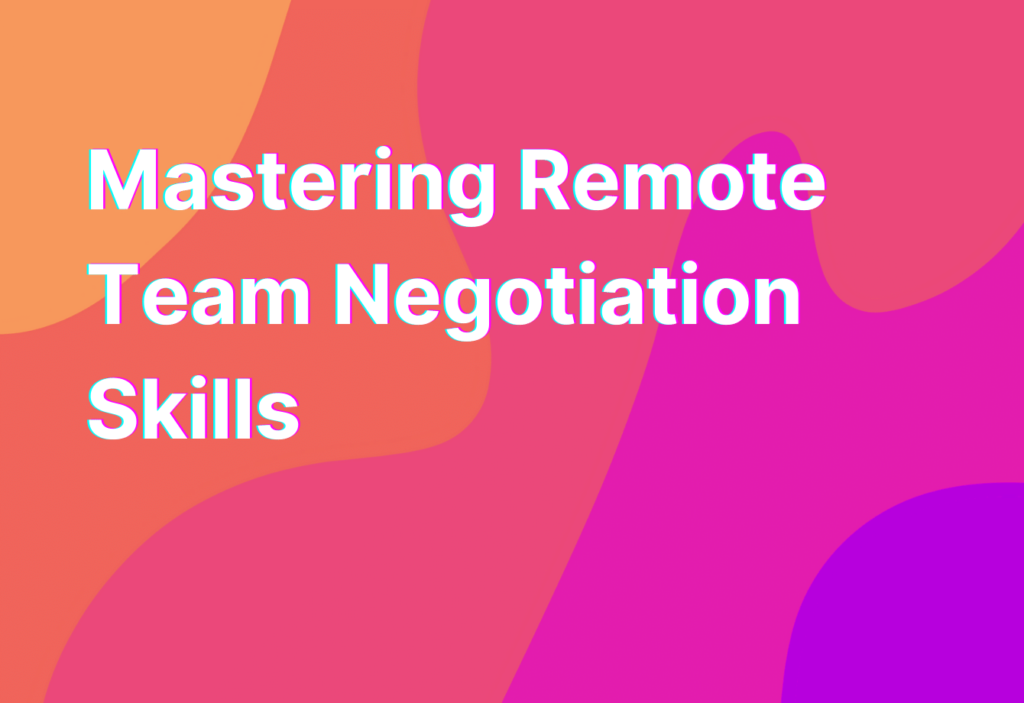Mastering Remote Team Negotiation Skills
Hey there, remote work warriors! It’s Ashley, your friendly neighborhood remote work advocate, back with another dose of helpful advice. Today, we’re diving into the world of negotiation skills for remote teams. Whether you’re a seasoned remote worker or just starting out, mastering the art of negotiation is crucial for success in the virtual workplace. So, grab your favorite cup of coffee (or tea, if that’s your thing) and let’s get started!
The Importance of Negotiation Skills
Before we jump into the nitty-gritty of remote team negotiation, let’s take a moment to understand why these skills are so important. In a traditional office setting, negotiation often happens face-to-face, allowing for non-verbal cues and immediate feedback. But in the remote world, communication happens primarily through digital channels, making negotiation a bit trickier.
Effective negotiation skills can help you navigate conflicts, reach mutually beneficial agreements, and build strong relationships with your remote team members. Whether you’re negotiating project timelines, resource allocation, or even work-life balance, having the right skills can make all the difference.
1. Prepare, Prepare, Prepare
As the saying goes, “Failing to prepare is preparing to fail.” This rings especially true when it comes to remote team negotiation. Before entering any negotiation, take the time to gather all the necessary information, set clear goals, and anticipate potential objections or challenges.
Research the topic at hand, understand the needs and interests of all parties involved, and come up with creative solutions that can benefit everyone. The more prepared you are, the more confident and persuasive you’ll be during the negotiation process.
2. Active Listening is Key
When negotiating remotely, it’s easy to get caught up in our own thoughts and assumptions. But effective negotiation requires active listening and understanding the perspectives of others. Take the time to truly listen to your team members, ask clarifying questions, and show genuine empathy.
Remember, negotiation is not about winning or losing; it’s about finding common ground and reaching a mutually beneficial outcome. By actively listening, you can uncover hidden interests, address concerns, and build trust with your remote team.
3. Embrace Technology
One of the perks of remote work is the abundance of technology at our fingertips. Take advantage of tools like video conferencing, project management software, and collaborative platforms to enhance your negotiation skills.
For example, platforms like Trello can help you visually organize your negotiation points and track progress. Video conferencing tools like Zoom or Microsoft Teams allow for face-to-face communication, even when you’re miles apart. Embracing technology can make remote team negotiation feel more personal and effective.
4. Be Flexible and Open to Compromise
In remote team negotiation, flexibility is key. Remember that everyone on your team has their own unique circumstances and constraints. Be open to compromise and explore alternative solutions that can meet the needs of all parties involved.
Flexibility also means being willing to adapt your negotiation approach based on the situation. Different team members may respond better to different communication styles, so be prepared to adjust your strategy accordingly.
5. Follow Up and Reflect
Once a negotiation is complete, it’s important to follow up and reflect on the outcome. Did you achieve your goals? Were there any missed opportunities? Take the time to evaluate your performance and learn from each negotiation experience.
Following up with your remote team members also shows that you value their input and are committed to maintaining strong working relationships. Send a quick email or schedule a virtual coffee chat to express your gratitude and discuss any next steps.
Wrapping Up
And there you have it, my fellow remote work enthusiasts! Negotiation skills are a must-have in the virtual workplace, and by following these tips, you’ll be well on your way to mastering the art of remote team negotiation.
Remember, preparation, active listening, embracing technology, flexibility, and reflection are the keys to success. So, go forth and negotiate with confidence!
Oh, and before I go, I wanted to share a fantastic resource with you. If you’re interested in learning more about effective strategies for remote team onboarding, check out this Onboarding process article on RemoteTeamer.com. It’s chock-full of valuable insights and practical tips to help you onboard your remote team like a pro!


